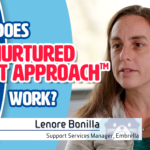There are many conversations parents never look forward to having with their children, such as answering why the family pet is no longer with them, who you love more and where babies come from. Along with the usual battery of questions, foster parents also face another one that is even more daunting: Why am I not with my real parents?
It’s a question that’s likely on your foster daughter’s mind, but she may be afraid to ask. She might not bring it up because she thinks she’s not supposed to talk about her biological parents or that asking about them will hurt your feelings. It’s important to create an opportunity for her to talk openly to you and reassure her that you’re always willing to answer any questions.
Talking to Your Foster Child About Her Parents
The thought of talking to your foster child about her parents may even scare you. Talking to your foster daughter about a difficult topic isn’t easy, but it can strengthen the bond between you and her. Not only will it help her gain a better understanding of why she’s with your family, but it also can prove that you’re someone she can trust. By creating an environment where you and your foster child can talk openly about her biological parents, you’re helping her rid herself of any shame she may feel about being in foster care.
It’s important to have a well thought out answer prepared before she’s works up the courage to ask about her birth parents. Answering a question of this magnitude off the cuff can hurt your foster child, rather than help her understand why she’s in your care. Using vague statements when talking to your foster child about her parents can result in her being more confused about her situation than she was before she talked to you. Depending on her age, going too in-depth when talking about her biological parents can turn the experience into a scarring memory for her.
There are several factors to keep in mind when talking to your foster child about her parents. Consider the age of your foster child. An answer that an older child would understand and accept is far different from one suitable for a preschooler.
Talking to Your Younger Foster Child About Her Parents
If your younger foster child asks about her biological parents, not only do you need to phrase your response in a way that she will understand but also put it in a way that you are okay with her repeating. A younger child’s more likely to share what you tell her with others, as she doesn’t know what to filter out when talking to certain people, which means she may repeat what you said to her parents during a visitation.
It’s important to put it in terms a younger child can to relate to. If her parent is incarcerated, you can explain the situation this way.
“You know how our house has rules? Some rules are so important they are called laws and everyone has to follow them, even grown-ups. When someone breaks a law they have to go away to time-out and learn how to behave. So you are staying with us until daddy is out of time-out.”
By relating laws to household rules and jail to time-out, you’ve explained what happened to her parent in terms that she’s familiar with and avoided using words that are harsh or hurtful. Don’t use words like addiction, abuse and poverty that can go over your younger child’s head or sound scary to her.
Along with using age-appropriate language, also try to normalize the situation she’s going through. One way to do this is by saying,
“Some parents need help getting a job or making safe choices before they can care for their child again, so while they are learning, their child stays with a family that has learned how to do those things.”
Phrasing her situation like this conveys a few messages to your foster child. It tells her that her parents are making an effort to better themselves, that there are other children going through similar situations and that you’re able to take care of her while her parents work towards reunification.
Talking to Your Older Foster Child About Her Parents
An older foster child will have a better grasp on why she’s with you, and answering her questions about her biological parents will require a more in-depth explanation. Explain to her more precisely what her parents did that lead to her removal. If her father was placed in jail, one way to explain it to an older child is by saying,
“Your dad broke the law by stealing from a family. A judge decided that he needed to go to jail to think about what he’s done. He’s going to be there for a year, so while he’s thinking about why he’s there, we’re here to take care of you.”
By putting the situation like this, you’re telling her the truth about what happened to her father without vilifying him. With this phrasing, she won’t see your response as an attack on someone she loves but rather an answer to a question that’s troubling her.
No matter the age of your foster child, she most likely knows more about why she is in foster care than you think. Remind her that if she ever wants to talk to you about anything she can come to you. Creating a safe space for her to talk freely can form the foundation on which you build your responses. When she does open up to you, listen closely to how she talks about her parents. Gauge her feelings and what she knows to determine how much information you should divulge and how to frame it.
When talking to your foster child about her parents, make sure she knows that it wasn’t her fault that she’s in foster care and that she isn’t being punished for something she did. Being in foster care can result in her feeling confused about her emotions. Reassure your foster child that it’s completely normal for her to care about both you and her birth parents at the same time.
If you have questions about your foster child’s past, you can work with her caseworker to gather information to use in your answer to her. If she asks questions that you don’t have answers to, discuss possibilities with your foster child in a positive light.
At first, talking to your foster child about her parents can seem like an intimidating assignment, but by taking the time to prepare a well thought out response you can transform it into a bonding experience.



1 thought on “How to Talk to Your Foster Child About Her Parents”